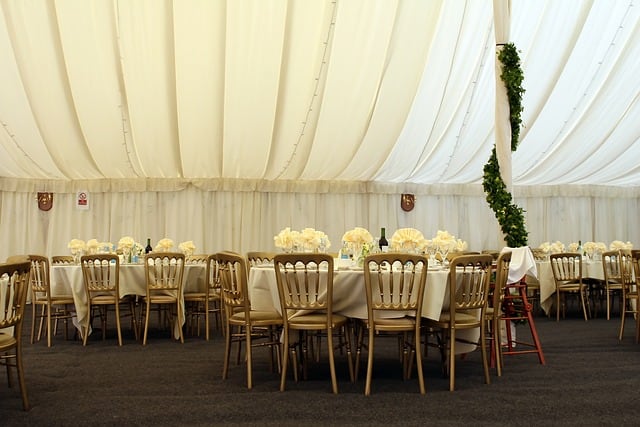Starting an Event Planning Business: What You Need to Know

Do you have a knack for planning and organizing events? Are you looking for a way to launch your own business and make some extra money on the side? Event planning is one of the most exciting and rewarding businesses out there. With the right skills, an eye for detail, and some determination, you can start your very own event-planning business. In this guide, we’ll discuss everything you need to know about starting an event planning business—from researching and budgeting to marketing your services. So let's get started!
Defining Event Planning Businesses
Event planning businesses are those that specialize in organizing, managing, and hosting events of all kinds. From wedding receptions and corporate parties to birthday celebrations and fashion shows, event planners can handle it all. Event planners must first identify their target audience, create a mission statement and develop a list of services they offer. They should also research the types of events they want to plan, determine their rates, acquire necessary permits and licenses, establish an office space, design marketing materials, and get business insurance. Additionally, they may need to purchase or rent equipment such as sound systems or lighting fixtures, hire staff members or subcontractors, find venues for events, and use event management software to streamline their operations.
Event planning businesses offer the opportunity to be creative, create unique experiences and make lasting memories. With the right dedication and expertise, event planners can turn any event into a success! Get ready for your next venture as an event planner, as we'll explore the many benefits of starting an event planning business in the next section.
Advantages of commencing an enterprise in the field of event planning.
Event planning is a potentially lucrative business that offers clients memorable experiences and lasting memories. It is also in high demand due to the need for commemorating special occasions or milestones by businesses and individuals.

ffective event planning demands meticulous attention to detail and innovative problem-solving abilities, which can distinguish your services from those of other event planners and guarantee a favorable client experience. Furthermore, as an event planner, you can collaborate with diverse individuals from various backgrounds, fostering personal development.
Starting a business in the events industry offers flexibility in terms of choosing when and where to work. It provides opportunities to manage corporate events or plan wedding receptions and allows individuals to determine the time and effort they dedicate to each project.
Research and Planning Before Launch
Before launching an event planning business, it is important to conduct thorough research and create a strategic plan. Researching the target market and potential clients is essential for creating a successful business model. Additionally, understanding the types of events within your niche as well as their unique needs is key for crafting an effective marketing strategy. Once you have identified these details, you can create a mission statement and start creating marketing materials such as business cards, flyers, or social media posts.
Developing a comprehensive business plan will also help in launching your event planning business. This document should include an overview of the events industry, your target audience, startup costs, pricing structure, office space requirements, and any other necessary details. Furthermore, you should research different event management software programs to help streamline processes and ensure that everything runs smoothly during each event. Finally, don’t forget to get proper licensing and insurance to protect your business from potential risks.
Using the above steps as a guide, you can launch your event planning business with confidence and success. With the right preparation and research, you can create a thriving business that helps others make their special occasions even more memorable. Now, let's dig into the types of events to focus on for your business!
Types of Events to Focus On
When starting an event planning business, it is important to identify the types of events you will be specializing in. Whether it’s corporate events, weddings, birthday parties, or social events, each type of event requires its own unique approach and skill set. For example, while planning a corporate event may require more technical expertise and networking opportunities than a wedding, both need creative solutions and organization skills. Additionally, understanding the different needs and budget constraints of each type of event can help determine which services you should offer.

From there, you can create an ideal client base for your business by focusing on the types of events that best fit your skill set and interests. Once you have identified these details, you can begin to devise a marketing strategy to reach potential clients in your target market. This could include creating social media accounts or advertising through online platforms. With the right focus and dedication, you can easily build your event planning business into a successful venture!
Target Market and Audience
Once you have identified the types of events you will plan, it is important to consider your target market and audience. Event planning services can be tailored to corporate, social, or wedding clients. Knowing who your ideal clients are and understanding their needs is essential for any event planning business.
For example, if you are targeting corporate clients, focus on creating a portfolio that showcases events that appeal to a professional audience. Additionally, network with other professionals in your area who may be able to refer potential customers for corporate events. If your focus is on weddings or social events, create marketing materials that are visually appealing and showcase your best work. Consider designing ads for local wedding magazines or creating a website dedicated to wedding planning services.
By understanding the target market and audience for your event planning business, you can tailor your services accordingly and develop an effective marketing strategy to reach potential clients in need of these services.
Types of Services Offered
To start an event planning business, think about the services you'll offer. These could be venue booking, catering, décor design, music and entertainment, and photography services. Decide if you'll provide full-service packages or focus on specific services. Offering different options lets clients choose what best suits their needs and budget.
In addition to full-service packages, you may also wish to offer event management software as part of your service offerings. This software allows clients to track their event's progress and make changes quickly and easily. Furthermore, by offering this resource you can increase efficiency in managing events.

Finally, depending on your target audience and the type of events planned, it is important to have an understanding of the legal requirements related to each type of event. Working with an attorney or consulting with a professional licensing organization can help ensure that all legal requirements are met for any given event or service provided.
Establish a Mission Statement
A mission statement is an important part of any successful event-planning business. It provides a clear direction for the company and serves as a reminder of the company's overall purpose. A well-crafted mission statement should include the type of events you plan, your target market, and what sets you apart from other similar businesses. It should also be concise and easy to remember.
When creating your mission statement, take time to consider what makes your event planning service unique. Brainstorm ideas such as providing exceptional customer service or offering innovative solutions for clients' needs. This will help create a mission statement that speaks directly to potential customers and sets you apart from other event planners in the industry.
Ultimately, your mission statement should capture the essence of what makes your event planning business great and why customers should choose you over others in the industry. By taking time to craft a strong mission statement, you can ensure that your business has a clear direction and focus on delivering quality services to clients.
Consider Startup Costs & Budgeting
When starting an event planning business, it’s important to consider the startup costs and budget for the company. This includes anything from office space to marketing materials to business insurance. First, estimate the total cost of launching your business. This includes items such as office equipment, printing materials, branding expenses, website design and development fees, and legal or professional services. You should also factor in any additional expenses that may arise during the first year of operation.

Once you have calculated the estimated cost of starting your business, create a budget for how much you can spend each month on operations. Be sure to include allowances for unexpected expenses as well as contingencies for any losses you may experience during your first year. Finally, make sure to track your spending closely so that you know when you need to adjust your budget accordingly. With careful budgeting and planning upfront, you can ensure that your event planning business is set up for success from day one.
Obtaining the Necessary Licenses, Permits & Insurance
Before launching your event planning business, you will need to obtain the necessary licenses and permits from your local government. Depending on where you are located, this may include a business license, health permit, or other special requirements for operating an event planning business. Additionally, it’s important to research any local zoning laws that may apply to your business.
You should also consider investing in insurance for your event planning business. This will protect you against potential liability and losses if something were to go wrong during one of your events. Talk with an insurance provider to learn more about what type of coverage is best suited for your business.
Finally, make sure you understand the tax regulations and requirements that come with owning a business. Contact the IRS or a professional tax advisor to discuss the different options available for filing taxes as a self-employed individual or small business owner. With the right permits, licenses, and insurance in place, you can confidently start building your event-planning empire!
Creating a Professional Presence for Your Business
Creating a professional presence is essential for any event planning business. Start by creating a website that showcases your services and portfolio of events. You should also create business cards with your contact information to distribute at events and networking opportunities. Finally, consider investing in marketing materials such as flyers or brochures to promote your event planning service.

Social media also plays an important role in establishing a professional presence for your business. Utilize popular platforms like Facebook, Instagram, and Twitter to build relationships with potential clients, announce upcoming events, and showcase your work.
Finally, if you plan on hosting events in person or meeting with corporate clients, it’s important to have an office space that reflects the professionalism of your company. Invest in quality furniture and decor to make sure that potential clients are impressed when they visit. With these steps complete, you will be ready to start taking on clients and building the success of your event planning business!
Having a professional presence is essential for any successful event planning business. With the right website, business cards, marketing materials, and office space your business will be ready to start taking on clients and building success! Now let's take it one step further and explore how to design a logo and develop a brand image that reflects the professionalism of your company.
Designing a Logo and Developing a Brand Image
Designing a logo and developing a brand image are essential steps for any event planning business. Start by making sure your logo reflects the personality of your company. Choose colors and fonts that reflect the atmosphere you want to create at your events. Additionally, consider incorporating elements from your mission statement into your logo to make it more meaningful.

Once you have developed a logo, use it to create branded marketing materials like flyers and banners to promote your services. Furthermore, think about how you can incorporate your company’s branding into other aspects of event planning such as decor or favor bags. This will help potential clients recognize and remember your business when looking for an event planner in the future.
Finally, leverage social media platforms to spread awareness of your brand image and create relationships with potential clients. Share photos from past events or highlight new services as part of an effective promotional campaign on Facebook, Twitter, Instagram, and more! Designing a logo and developing a brand image is key for setting yourself apart from other event planning businesses – so make sure you get it right!
Creating Business Cards and Marketing Materials
Business cards are an essential tool for any event planning business. They offer potential customers a tangible representation of your services and can be distributed in a variety of ways. Start by creating a design that reflects the look and feel of your company logo, color scheme, and mission statement. Include all relevant contact information like address, phone number, email, and website URL on the card.
Once you have designed your business cards, think about other marketing materials you can create to further promote your services. Develop flyers and banners with interesting designs to draw attention to your events or services. Additionally, consider setting up booths at local events or trade shows to showcase what you do and distribute promotional materials such as brochures or discount vouchers.
Overall, creating business cards and marketing materials is an effective way to reach potential clients and build relationships with them over time. Make sure the design accurately reflects your brand image so that people can easily recognize it when looking for an event planner in the future!
Building a Website for Your Event Planning Business
Having an online presence is essential in the modern business world. An event planning website allows potential customers to easily find your services and contact you for more information. When building a website, think about the type of content you want to include, such as a portfolio of past events, testimonials from satisfied clients, and detailed information about the services you offer.
It’s also important to make sure your website is optimized for search engine rankings so that people can find it when they search relevant terms. Additionally, consider setting up social media accounts and linking them to your website so visitors can connect with you and stay updated on new services or events.
Finally, remember to keep your website up-to-date with current content and photos of past events. This will help potential customers get an idea of what kind of work you do and how professional your services are. Building a strong online presence will help ensure that your event planning business stands out from the rest!
Utilizing Social Media Platforms for Promotion & Networking
Social media platforms can be a great way to promote and network for your event planning business. When setting up accounts, make sure you choose the most relevant platforms for your target audience and use them as an avenue to showcase your services, share photos from past events, announce new offerings, or provide tips on how to plan successful events.

By interacting with other event planners and potential clients on social media channels, you can create relationships and build your network. You may also consider running ads or sponsored posts to reach a larger audience. Additionally, joining groups related to event planning topics on social media is another great way to engage with other professionals in the industry.
Overall, utilizing social media platforms effectively is essential for any business in today’s digital world. By making connections and building relationships online, you can successfully promote your event planning services while networking with potential clients.
Acquiring Clients & Growing Your Client Base
Acquiring clients and growing your client base is an essential part of running a successful event planning business. To start, create a portfolio of past events to showcase your services and provide potential clients with an idea of what you can do. Additionally, having a website or blog can help you reach more people and attract new customers.
Word-of-mouth referrals are also important for gaining new clients, so make sure to ask past customers for feedback and reviews that you can share with potential clients. You may also consider hosting events yourself as well as attending industry events and trade shows to build connections with other professionals in the industry.
Finally, make sure to utilize social media platforms such as Instagram, Facebook, Twitter, and LinkedIn to promote your services, network with potential contacts, and post about upcoming projects or successes from previous ones. By utilizing all these methods, you’ll be able to grow your client base and set yourself up for success in the event planning world.
Utilizing Event Management Software & Tools
Utilizing event management software and tools is an important part of running a successful event planning business. Event management software helps to streamline the process of organizing events by providing a platform for tracking customer data, managing guest lists, creating online invitations, and much more. Additionally, tools such as analytics platforms can help you gain insights into your target audience and optimize your marketing strategy.
By utilizing event management software and tools, you’ll be able to manage the logistics of hosting events with ease. This will free up your time so you can focus on providing exceptional customer service to clients and developing relationships with potential customers. With the right software in place, you’ll be able to focus on growing your business and making your mark in the world of event planning.
Conclusion
Starting an event planning business is a great way to turn your passion for planning and managing events into a successful career. By creating a business plan, researching your target market, and utilizing the right event management software and tools, you can start building your business from the ground up. With the right strategies in place, you’ll be able to develop a strong client base and provide exceptional customer service. As you grow your business, don’t forget to stay active on social media platforms as well as create marketing materials that will help promote your services. With hard work and dedication, you can have a profitable event planning business in no time.
People also ask

How do I sell myself as an event planner?
To sell yourself as an event planner, you must showcase your skills and experience in planning successful events. Start by creating a strong portfolio that includes examples of events you have planned in the past, along with client testimonials. Highlight your attention to detail, organization skills, and ability to stay calm under pressure. Be confident in your ability to handle any challenge that comes your way, and emphasize your flexibility and creativity in crafting unique and memorable events. Network with other professionals in the industry and attend industry events to build your reputation and gain exposure. Finally, be passionate about your work and show your clients that you truly care about making their event successful.
What type of event planner makes the most money?
The type of event planner that makes the most money is usually those who specialize in corporate events such as product launches, conferences, and trade shows. These events require a high level of organization and coordination with multiple vendors and stakeholders, which can result in higher fees for the planner. In addition, corporate clients often have larger budgets and are willing to spend more on their events, allowing for higher fees and profit margins. However, it is important to note that the amount of money an event planner makes ultimately depends on their experience, reputation, and ability to negotiate fees with clients.
What are the responsibilities of an event planner?
The role of an event planner is to organize and coordinate various events such as weddings, corporate events, conferences, and other social gatherings. They are responsible for ensuring that every detail of the event is planned and executed flawlessly, from choosing the right venue, catering, entertainment, decor, and transportation. They work closely with their clients to understand their vision and goals for the event, and then use their creativity and problem-solving skills to bring those ideas to life. Event planners also manage the budget and timeline of the event, ensuring that everything runs smoothly and within the allotted resources. With their attention to detail and excellent communication skills, event planners ensure that every guest has an enjoyable and memorable experience.
How can I make money from my event?
There are several ways to make money from hosting an event. One option is to sell tickets or charge an admission fee to attendees. You can also offer sponsorships to companies or individuals who want to promote their brands or products at your event. Another way to generate revenue is by selling merchandise such as t-shirts, hats, or other items related to your event. If your event includes food or beverage vendors, you can charge them a fee to participate or take a percentage of their sales. Lastly, you can monetize your event by offering premium experiences or VIP packages for attendees who are willing to pay a higher price for special perks or access. It is important to carefully consider your pricing strategy and ensure that the value you offer exceeds the cost to attend or participate in your event.
What are the opportunities for event planning?
There are a plethora of opportunities available for event planning. With the rise of social media and the increasing popularity of experiential marketing, the demand for professional event planners has skyrocketed. Event planners can work on a variety of events, including weddings, corporate events, conferences, festivals, and more. There is also an opportunity to specialize in niche areas, such as sustainable events or technology-focused events. With the growth of the events industry, there is a need for skilled professionals who can handle logistics, vendor management, marketing, and more. Additionally, event planning allows for creativity and the ability to bring people together, making it a fulfilling career choice for those who enjoy planning and organizing.

Comments